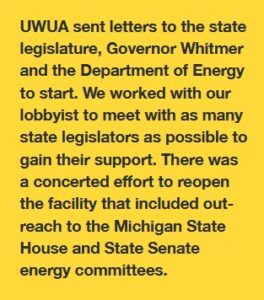My first visit to the Palisades Nuclear Plant was in the mid-1990s as the newly elected vice president of Local 150. During my nearly 25 years with the local and then the Michigan State Utility Workers Council (MSUWC), I made countless trips to Palisades, located just 40 miles from my hometown near South Haven, Michigan, for various union-related activities.
From its inception and through its first two decades of operation, the UWUA represented nearly 250 members out of the plant’s roughly 600 total employees. For Local 150, which represents eight different work locations, Palisades comprised half of its membership until then-owner Entergy’s 2017 announcement to cease operations in 2022.
Entergy purchased Palisades from Consumers Energy in 2007, operating it for nearly 15 years before its May 2022 shut down and June 2022 sale to Holtec International for decommissioning. With the plant ceasing operations, membership dropped to 36. We had watched what happened at Entergy’s Pilgrim and Indian Point plants and knew decommissioning represented the end of employment at Palisades.
During its 50 years of operation, Palisades faced mechanical issues and regulatory concerns, attracting criticism and calls for closure from environmental groups. However, thanks to the dedication and professionalism of UWUA members, the plant maintained safe operations throughout its history, stifling closure demands.
Entergy’s decision to close Palisades in 2017 was largely due to the changing economic landscape of the energy industry. The rise of natural gas as a cheap and abundant energy source, along with the growing competitiveness of renewables, put significant economic pressure on nuclear plants. These industry changes, coupled with the high costs of maintaining and upgrading the plant, led to Entergy’s decision to shut it down.
With the acceleration of coal plants closing and the Palisades closure, concerns began to arise over an impending energy shortage in the state. Policy makers started questioning the decisions to close coal generating plants, with some in the legislature calling for the plants to continue operation, but too many plants were too far gone to restart.
When Holtec began its decommissioning assessment, it was surprised with the plant’s physical
condition and began expressing interest in restarting instead. Holtec representatives reached out to Local 150 and the UWUA for assistance in securing support from Michigan’s legislature and governor. The company sought state backing for the restart, including financial commitments that would signal strong support to the U.S. Department of Energy, which had funds earmarked for nuclear plant operations under the Biden Administration.
To start, UWUA sent letters to the state legislature, Governor Whitmer and the Department of Energy. We worked with our lobbyist to meet with as many state legislators as possible to gain their support. There was a concerted effort to reopen the facility that included outreach to the Michigan State House and State Senate energy committees. The breakthrough moment was when we got the state representative on board who represents Palisades. From there we worked hard to lobby the governor and get her support.
Thanks to the efforts of Local 150 and the UWUA, Michigan Governor Gretchen Whitmer guided the state’s legislature to commit $150 million to support Palisades’ restart. At the same time, Holtec demonstrated demand for nuclear power by securing long-term power purchase agreements with Wolverine Power Cooperative and Hoosier Energy in Michigan, Illinois, and Indiana.
With a concerted advocacy effort and strong support from state, UWUA, and community partners, Holtec applied to the DOE for federal funding to repower Palisades. On March 27, Governor Whitmer and U.S. Energy Secretary Jennifer Granholm traveled to Palisades to announce a $1.5 billion federal loan for the plant’s restart (see page 5).
When members ask about the Biden Administration’s impact on the UWUA, they need look no further than its support for Palisades.

